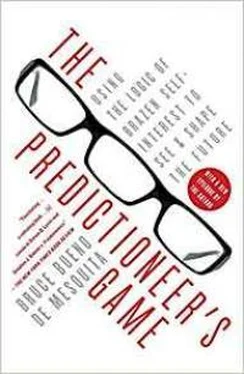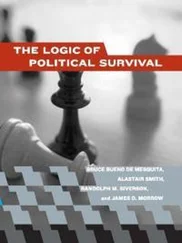Another way that people talk about rationality that has nothing to do with what “rational choice theorists” have in mind is to discuss whether what someone wants is rational or not. Distasteful as the fact may be, people with crazy ideas can be perfectly rational. Rationality is about choosing actions that are consistent with advancing personal interests, whatever those interests may be. It has nothing to do with whether you or I think what someone wants is a good idea, shows good taste or judgment, or even makes sense to want.
I certainly think what Adolf Hitler said he wanted and what he did to advance his heinous goals were evil, but I am reluctant to let him off the hook with an insanity plea by saying he was not rational. His actions were rational given his evil aims, and therefore it was perfectly right and proper to hold him and his henchmen accountable.
The same holds for modern-day terrorists. They’re not nuts. They are desperate, calculating, disgruntled people who are looking for ways to force others to pay attention to their real or perceived woes. Dismissing them as irrational misses the point and leads us to make wrongheaded choices about how to handle their threat. We do ourselves no service by labeling people as insane or irrational simply because we can’t understand their goals. Our attention is better fixed on what they do, since we probably can change or impede their actions even when we can’t alter what they want.
What exactly does rationality require? Actually it’s a simple idea. To be rational, a person must be able to state a preference among choices, including having no preference at all (that is, being truly indifferent). Also, their preferences must not go in circles. For instance, if I like chocolate ice cream better than vanilla—who doesn’t?—and vanilla better than strawberry, then I also presumably like chocolate ice cream better than strawberry. Finally, rational people act in accordance with their preferences, taking into account the impediments to doing so. For instance, one ice cream parlor might be sold out of chocolate more often than another. I might be willing to risk having to settle for vanilla if the place that runs out also has much better tasting chocolate. Taking calculated risks is part of being rational. I just need to think about the size of the risk, the value of the reward that comes with success, and the cost that comes with failure, and compare those to the risks, costs, and benefits of doing things differently.
Since rational people take calculated risks, sometimes things turn out badly for them. Nobody gets everything they want. I sometimes end up drinking soda I don’t like or eating vanilla or strawberry ice cream despite my best efforts to obtain what I prefer. That’s what it means to take risks. We absolutely cannot conclude that someone was irrational or acted irrationally just because at the end of the day they got a rotten outcome, whether that means being stuck with strawberry ice cream, losing a war, or even worse.
Rational choices reflect not only thinking through risks but also trying to sort out costs and benefits. Costs and benefits can be tricky to work out. I could be unsure of what those costs or benefits are likely to be. That too can be an important impediment or constraint on my rational decisions. Sometimes we have to make decisions even though we are in the dark about the consequences. Fortunately, that doesn’t happen much with buying ice cream or soda, but it sure happens a lot when negotiating a big business deal or forging a new foreign policy. In those cases, we had better be careful to weigh the sources of our uncertainty carefully, and not plunge headlong into some dangerous endeavor with no more than rose-colored glasses to guide our way. We may not get the consequence we want, but we can be careful to manage the range of consequences that are likely to arise. (Just imagine how different the debacle in Iraq might have been, for example, had American leaders not thought that the Iraqi people would be dancing in the streets, kissing American soldiers after Saddam was overthrown the way Parisians did when Americans marched into Paris behind Charles de Gaulle on August 26, 1944.)
The question remains, however, as to when someone is actually irrational. In everyday usage, lots of behavior looks irrational even though on closer inspection it turns out not to be. Sometimes critics point to behavior like leaving tips in restaurants, giving gifts to friends, or—sorry, I don’t mean to be gross—flushing the toilet in public places like airports or museums as irrational acts. They argue that all of the benefit goes to someone else, not to the tipper, gift giver, or flusher. I say, not true.
Many rational acts impose short-term costs on the doer with the expectation of longer-term gains. That’s true of tipping, gift giving, flushing public toilets, not littering, and lots more. Sure, you might leave a tip even though you don’t expect to be in the particular restaurant again. Tipping, however, like gift giving, is a social norm that has arisen and taken hold because we have learned that its effects on the expectations of others (waiters, dinner party hosts) are important to making our own lives a little happier and easier. If waiters thought they weren’t going to get a tip and yet continued to be paid poorly, then it’s a good bet that service would be much worse in every restaurant. Studies show, for instance, that customer satisfaction with service does not help predict the restaurants people choose in southern China. 5Tipping is illegal in China (which is not to say that it never happens, but it isn’t expected). It is good to keep in mind that people act on expectations. It seems that the quality of service doesn’t vary much between restaurants in southern China, because the service ethic just isn’t guided by anticipated rewards for good service. Take away the expectation of tips, and the waitstaff is motivated by something other than the customers’ interests and the waiters’ rewards for satisfying those interests.
Tipping, gift giving, and, yes, flushing the toilet create good expectations that make each of us better off most of the time even if they cost a little at the moment. Sure, we could free-ride on the good acts of others, save a little money or the little bit of effort it takes to flush a toilet or throw litter in the garbage can instead of on the street, but most of us would feel bad about ourselves if we did that. The urge to feel good about ourselves—not to take the risk of offending others and not to bear the cost of their reaction—is sufficient to induce us to behave in a socially appropriate way. For the few misanthropes who prefer to save the money that a tip or a gift costs or the effort that flushing a toilet costs, well, they are behaving rationally too. They aren’t concerned about feeling like lowlifes. They value the savings from their poor behavior more than goodwill or long-term good results. That’s why there really is no accounting for taste. Rationality is, as I said, about doing what you believe is in your own interest; it doesn’t impose interests on us.
So what does constitute irrationality in an applied game theorist’s world? A person is irrational if, returning to the example of ice cream flavors, all of the following are true: she likes strawberry ice cream better than chocolate; strawberry ice cream costs no more than chocolate ice cream; strawberry ice cream is readily available for purchase; and still she goes and buys chocolate ice cream for herself. In such a case, I might wonder whether she had eaten so much strawberry ice cream recently that she wanted a change (a preference for variety over constancy, adding another dimension to the things preferred that was not included on my list) or something like that, but if those sorts of considerations are absent, then a strawberry lover is expected to eat strawberry ice cream when everything else is equal.
Читать дальше












